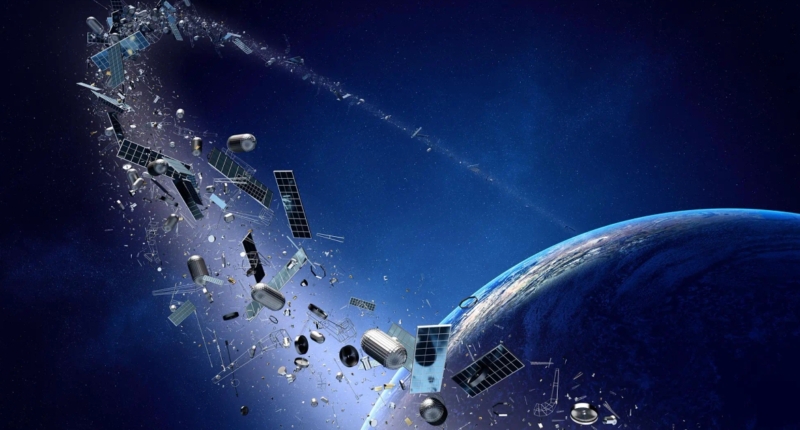Experts are calling for a legally-binding treaty to safeguard Earth’s orbit from irreparable damage caused by the growing global space industry. With an expected increase of satellites in orbit from 9,000 to over 60,000 by 2030, there are fears that large parts of Earth’s orbit will become unusable. Researchers from different institutions highlight the need for global action to prevent damage to the use of space for future generations. They draw parallels between the accumulation of plastic litter in the marine environment and the accumulation of debris in space. Leaders must become jointly accountable for safeguarding space for future generations.
Protecting Earth’s Orbit: Urgent Need for Global Consensus to Eliminate Hazardous Space Debris
Experts are calling for a legally-binding treaty to safeguard Earth’s orbit from irreparable damage caused by the growing global space industry. The University of Plymouth is leading a collaboration of scientists who urge leaders to learn lessons from the management of the High Seas and take action to protect Earth’s orbit.
Currently, there are about 9,000 satellites in orbit around Earth, and this number is expected to increase to over 60,000 by 2030. This expansion, combined with the over 100 trillion untracked pieces of old satellites in orbit, raises concerns that parts of Earth’s orbit will become unusable.
Writing in the journal Science, experts in satellite technology and ocean plastic pollution stress the urgent need for a legally-binding treaty to ensure the sustainability of Earth’s orbit. This treaty should govern how to manage Earth’s orbit and enforce satellite sustainability. The agreement should include measures to implement producer and user responsibility for satellites and debris, from the time they launch onwards, and consider commercial costs when incentivizing accountability.
Experts also argue that any nation with plans to use Earth’s orbit should be included in the enforcement of satellite sustainability. They believe that unless immediate action is taken, large parts of Earth’s orbit could suffer the same fate as the High Seas. Insubstantial governance has led to overfishing, habitat destruction, deep-sea mining exploration, and plastic pollution in the High Seas, highlighting the importance of taking lessons learned from one part of our planet to another.
In conclusion, protecting Earth’s orbit is an urgent matter that requires a global consensus on how best to govern it. Any agreement must ensure satellite sustainability, implement producer and user responsibility, and consider commercial costs. All nations with plans to use Earth’s orbit should be involved in the enforcement of the treaty. If we do not take immediate action, we risk facing the same fate as the High Seas, and we cannot afford to let this happen.
Scientists and Researchers Collaborate to Address the Growing Issue of Space Debris
A team of researchers from the University of Plymouth, Arribada Initiative, The University of Texas at Austin, California Institute of Technology, NASA Jet Propulsion Laboratory, Spaceport Cornwall, and ZSL (Zoological Society of London) have come together to address the growing issue of space debris.
Led by Dr. Imogen Napper, Research Fellow at the University of Plymouth, the team stresses the need for global action to prevent irreparable harm to Earth’s orbit caused by the accumulation of space debris. Drawing on lessons learned from the management of the High Seas, they highlight the importance of collaborative action and the implementation of solutions.
The study was funded by the National Geographic Society, and the team included scientists who contributed to the commitment to develop a Global Plastics Treaty signed by 170 world leaders at the United Nations Environment Assembly in March 2022.
Heather Koldewey, ZSL’s Senior Marine Technical Advisor, emphasizes the need for scientists to work together across disciplines to accelerate solutions. The team draws parallels between the challenges of tackling environmental issues in the ocean and the growing issue of space debris.
Dr. Moriba Jah, Associate Professor of Aerospace Engineering and Engineering Mechanics at The University of Texas at Austin, highlights the importance of stewardship and embracing the links and interconnectedness among all things. According to Dr. Kimberley Miner, Scientist at the NASA Jet Propulsion Laboratory, minimizing the pollution of the lower Earth orbit will allow for continued space exploration, satellite continuity, and the growth of life-changing space technology.
The team’s collaboration is a reminder that addressing planetary problems requires bringing together experts from different fields to work collectively and identify solutions. Without global action, we risk facing irreparable harm to Earth’s orbit and the same fate as the High Seas.
Urgent Need for Proactive Measures to Safeguard Space for Future Generations
Melissa Quinn, Head of Spaceport Cornwall, highlights the vital role satellites play in the health of our economies, security, and the Earth itself. However, she emphasizes that using space to benefit people and the planet is at risk. By learning from the treatment of our seas, we can take proactive measures to prevent damage to the use of space for future generations. Humanity needs to take responsibility for our behaviors in space now, not later.
Professor Richard Thompson OBE, Head of the International Marine Litter Research Unit at the University of Plymouth, draws parallels between the accumulation of plastic litter in the marine environment and the accumulation of debris in space. He highlights the need for a proactive stance to safeguard the future of our planet and the relevance of learning from mistakes made in our oceans.
Both experts emphasize the urgency of taking action now to prevent irreparable harm to space and the planet. Leaders must recognize the significance of this issue and become jointly accountable for safeguarding space for future generations.
Don’t miss interesting posts on Famousbio
